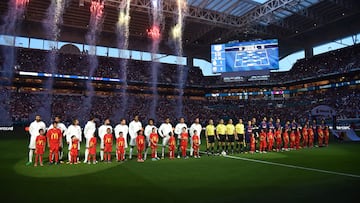This is how the Villarreal vs Barcelona plan in Miami fell through
LaLiga prematurely announced a match that would not be played on American soil. The players’ anger and the position of Real Madrid were underestimated.

You should never declare victory before your time. LaLiga did just that on October 8th when, on its fourth attempt, it announced it would finally take Spanish football to the United States. On December 20th, for the first time in First Division history, a LaLiga match would be played outside Spain. Or so said its president, Javier Tebas, that same day in Miami, accompanied by a press release. Together with Relevent, the league’s management dared to announce a match that wasn’t fully secured—underestimating the other key players in football: the athletes, CONCACAF, Real Madrid, the Spanish government… And so began the chronology of the American fiasco.
The plan to stage the Villarreal–Barcelona match abroad was doomed from the start. Back in August, the project was hastily presented to the Federation’s Board of Directors. This time, LaLiga stayed in the shadows, leaving Relevent and the two clubs as the official promoters. Tebas himself didn’t even attend the meeting where the RFEF gave its initial approval, despite being its vice president—a meeting that already set off alarm bells. The vote went ahead without the players’ consent or even their knowledge, and almost no one in the room seemed to care. Only two people spoke up: David Aganzo, president of the players’ union (AFE), who clashed openly with Louzán over the issue, and Miguel Ángel Nadal, who objected after realizing that the other clubs hadn’t been informed either.
It became clear that this “historic and unparalleled opportunity for the internationalization of Spanish football” was being pursued without the approval of either the clubs or the players. As several club presidents pointed out: “We were not involved in the decision, nor were others,” said Jokin Aperribay of Real Sociedad. Getafe’s Ángel Torres was even blunter: “It’s an aberration.”
From the start, two key forces emerged that would ultimately bring the plan down. One was Real Madrid’s formal complaint to the CSD (Spain’s Sports Council). The other—perhaps the most underestimated—was the strength and unity of the players. They met urgently, furious that a project violating their collective bargaining agreement had advanced without explanation. “We are united. We want respect and transparency,” they declared in an AFE statement. It was the first warning to Tebas: If you don’t inform us, we won’t play. But LaLiga didn’t take them seriously—nor did the clubs. As Villarreal CEO Roig Negueroles told El Larguero: “I haven’t read the statement, but from what I hear, most captains aren’t involved. You’re the one saying the players don’t want to go.” They were wrong.
🚨 NOTA INFORMATIVA.
— LALIGA Corporativo (@LaLigaCorp) October 8, 2025
LALIGA confirma la celebración en Miami del partido oficial entre @VillarrealCF y @FCBarcelona.
📅 20 de diciembre de 2025 en el Hard Rock Stadium.
The players proved that they were organized and influential. Despite their warnings, they were ignored. On October 6th, UEFA reluctantly gave the green light to the Miami Plan—just like LaLiga and the RFEF, without consulting the captains despite their written request. When LaLiga made the official announcement two days later, player frustration boiled over. “We demand respect,” they repeated. Then came the breaking point—a single phrase and a notable absence.
On Monday, October 13th, Javier Tebas underestimated the players’ anger when asked about their opposition to the Miami trip: “I’m not so sure the AFE wants to stop it.” According to AS, that comment infuriated the captains, who had already been denied a meeting with Tebas due to “scheduling conflicts.” They had hoped to meet at the AFE headquarters on Tuesday the 14th—alongside representatives from Villarreal and Barcelona—to hear explanations. Even until the last minute, the captains were unsure whether to travel to Madrid. One club claimed it had never received an invitation; another backed out upon learning Tebas wouldn’t attend. LaLiga did propose alternative meeting dates—Wednesday, Thursday, or Friday—but the players rejected them. Those were competition days, when they were either training or playing. They wanted to be heard at the table, and they felt disrespected.
That’s when the players made their move, delivering a blow that shook LaLiga. The “uncertainty generated in Spain,” as Relevent would later describe it when canceling the Miami Plan, began with their protest. On October 14th, the captains decided to act—a 15-second stoppage at the start of the next matchday. A symbolic warning of the power Tebas and others had underestimated. By Thursday the 16th, LaLiga had caught wind of the initiative, and panic set in. The league sent several letters urging AFE to cancel the protest. Executives even messaged some captains directly, to no avail. The protest went ahead—but was censored. That only fueled the players’ fury, especially after they received a letter from LaLiga the following Monday warning that legal action was being considered.
LaLiga headquarters became a powder keg. Officials tried to persuade the players to meet and promised to share all necessary information—so long as it wasn’t subject to confidentiality. But the captains, feeling ignored and betrayed, demanded ticket sales be paused so talks could begin. LaLiga accused AFE of “acting in bad faith.” The standoff made international headlines just as two new fronts opened.
🚨 𝗢𝗙𝗜𝗖𝗜𝗔𝗟 | La RFEF dará traslado a UEFA y FIFA de la solicitud para la disputa de un partido de Primera División en Miami
— RFEF (@rfef) August 11, 2025
➡️ La Junta Directiva de la RFEF ha dado su visto bueno a la tramitación de la solicitud realizada por @FCBarcelona y @VillarrealCF para la… pic.twitter.com/e9O2B5XVfa
On Wednesday, October 21st, the final blows landed. CONCACAF and the U.S. Soccer Federation were growing increasingly angry. Their approval was required, yet they too had been blindsided by the announcement. Feeling disregarded, CONCACAF raised the stakes by insisting on appointing the referee and pushing the RFEF to ask FIFA for clarification. Meanwhile, across the Atlantic, Real Madrid and two of its players unleashed a new wave of pressure that ultimately scared Relevent off.
Player backlash grew harsher. “Breaking the rules adulterates the competition. It will stain it forever if the game is played,” posted Dani Carvajal. Courtois, before a Champions League match, added: “It’s easy to compare this with the NBA or NFL, but those leagues have 82 games or a playoff system that doesn’t alter fairness. Here, it’s different—they just do it because they feel like it. It corrupts the competition and violates the players’ agreement.”
At the same time, Real Madrid filed a second complaint with Spain’s High Council for Sports, demanding the Miami Plan be stopped for “corrupting the competition.” The CSD, which had been reviewing the case for two months, confirmed it would rule quickly—pending a Federation report on regulatory violations. Political pressure was mounting, and the government’s stance was clear. “I am in favor of national competitions being played in Spain,” stated Pilar Alegría, Minister of Sports. Any legal obstacle would have doomed the plan.
Villarreal vs Barcelona in Miami has been cancelled. Huge news. https://t.co/r2wM3MHRwo
— Joe Brennan (@j4brennan) October 21, 2025
Related stories
The Miami Plan’s collapse was the result of months of tension, miscommunication, and misjudgment. Conflicting interests over money, political resistance, and—above all—the power of the players combined to sink it. Without them, there is no football. LaLiga announced something that was never truly secured and, in the end, was forced to wake up from its American dream—however profitable it might have been for Spanish football’s global ambitions. Few would doubt that.
Get your game on! Whether you’re into NFL touchdowns, NBA buzzer-beaters, world-class soccer goals, or MLB home runs, our app has it all. Dive into live coverage, expert insights, breaking news, exclusive videos, and more – plus, stay updated on the latest in current affairs and entertainment. Download now for all-access coverage, right at your fingertips – anytime, anywhere.


Complete your personal details to comment